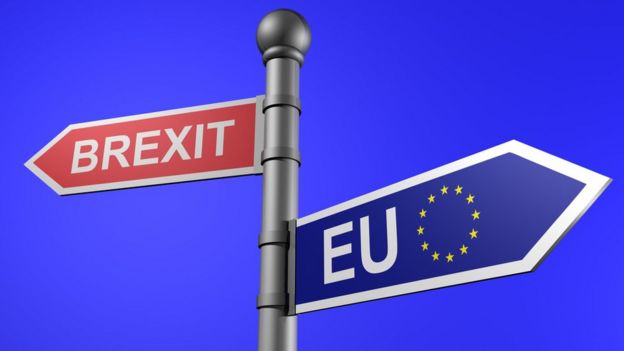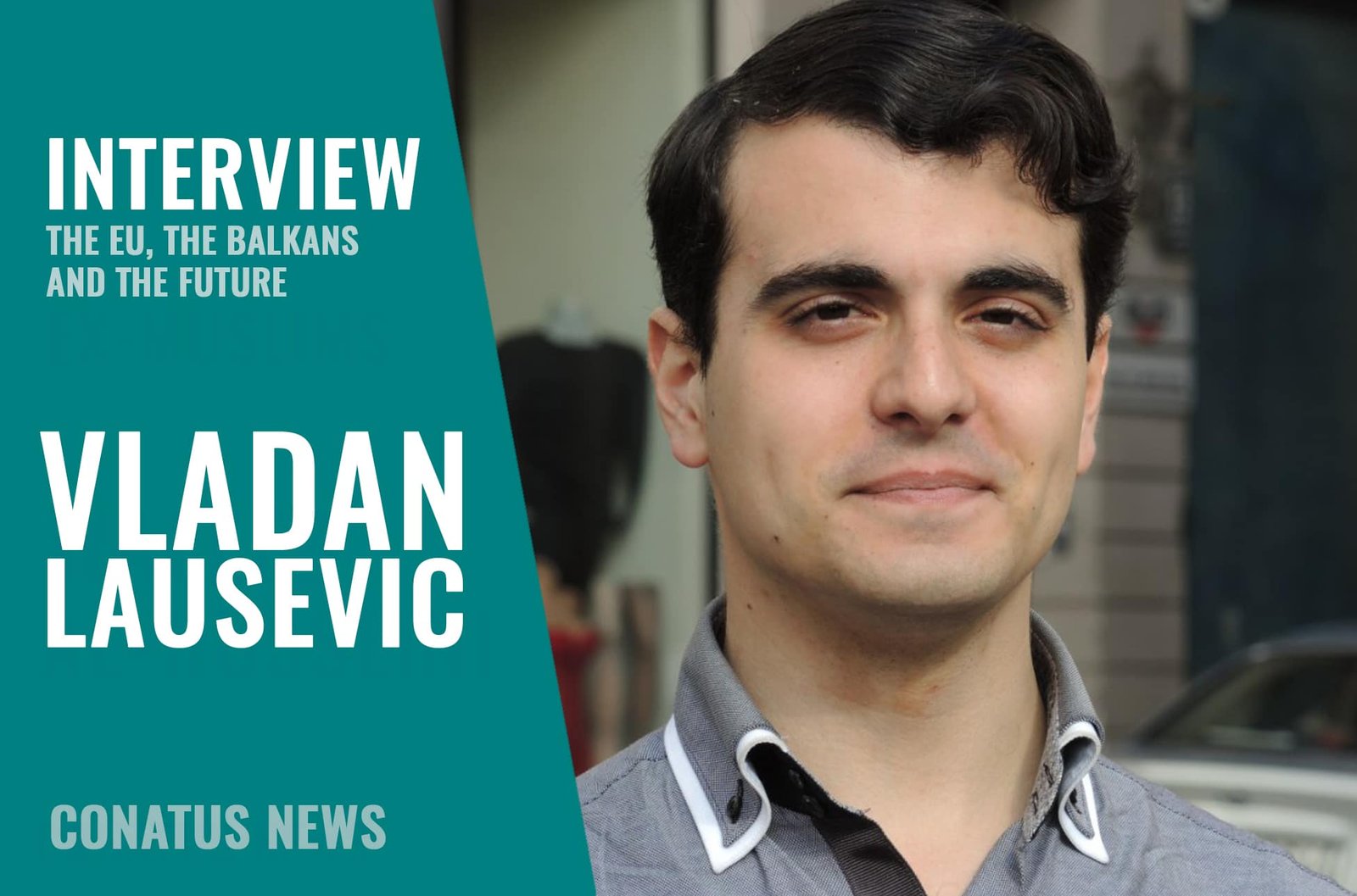Interview with “bleeding heart libertarian” Vladan Lausevic, of “Vlad’s History Blog,” on the future of federalism in the EU.
Recently, I had the opportunity to chat with Vladan Lausevic, a young academic loudly speaking up on EU and its many possibilities to grow into an inclusive, free and open place. He’s a columnist at a Swedish liberal idea hub Frihetssmedjan and runs “Vlad’s history blog,” an academic blog covering topics of history and especially military history. Now, we seem to be in need of gaining new perspectives on the EU and where it’s heading, so read on to get Vlad’s views on the topic – along with a few other interesting things.
Zorana Vuk: Thank you so much for giving us this interview! So please tell me, how did you get into the field of political science, military history and libertarianism? How does this happen?
Vladan Lausevic: You are welcome! Thank you for giving me the opportunity to tell my story. I got interested in politics, science, developments in society already in my childhood. The common ground here is my experience as a child during and after the war in Bosnia. I am a curious person by nature and so during the 90’s I wanted to understand why the war took place and how my society and local environment was affected by that. I was born and raised in a “teacher family” and my mother, my grandparents and several relatives have background as teachers and educators.
Growing surrounded by books, in environment almost looking like a private library, was a huge part of my upbringing. History became my passion thanks to my grandfather who was a subject teacher in history and geography. In addition, my family was promoting more civic, universal, liberal-democratic values in an environment under heavy influence of hard-core nationalism and political extremism. I think it also influenced my “hunger for knowledge” that kept me going through life. Being a humanist and not a religious person, I find that it is the political ideologies and scientific research that stand for values and meaning. I intend to develop more about that during next year in the book I have started to write – “Child of Globalization”.
ZV: Let’s start soft then. What reasons do you find have most contributed to the upswing of nationalism and extremism within Western countries recently? Nazi groups getting louder, extreme right-wingers taking a step into the political spotlight – what’s going on?
VL: It is a mixture of socioeconomic and socio-cultural problems and challenges. At this moment, it is mostly related to views on culture, identity, values. I usually start with referring to the global financial and economic crisis taking place in 2007 and 2008. It really had an impact both on people`s hearts and minds, on political actors across the world. It actually marked the end of a period of higher degree of socioeconomic growth, progression and optimism.
Another central starting point is the economic crisis in the EU, the Euro zone crisis from 2009 and 2010. The Euro zone crisis became also the part of the democratic and values crisis with lower levels of trust into EU-governments and institutions. Economic problems led to processes connected to social unrest, feelings of disappointment, pessimism and fear.
The rise of national populism in Europe is often explained in these terms and by refereeing to “winners and losers” of globalisation. But being a winner or a loser is not only about working class and middle class, not only about the socioeconomic aspects. It is also relevant to identifications since the “winners” tend to be the individuals who also can see themselves as Europeans, cosmopolitans and have transnational identifications while the “losers” often see their nation-based identification as the only or main identification.
Populist actors, regardless of ideology, have their political communication based on that the people are suffering because of the behaviour of the elites who have promoted or supported aspects as globalisation, European integration, free trade, financial markets, immigration etc. For many people, as for the Europeans, it is very easy to think that things used to be better before, that there is a choice between a better past, a former golden age on one side and an uncertain future on the other one. One can argue Europe is “rediscovering” nationalism since the state is still seen as the main and necessary protector, not only of the socioeconomic order as with the welfare state or labour market, but also when it comes to aspects as collective identification.
The impact of the global migration crisis and its different consequences on Europe during 2015 and 2016 have also resulted into rising popular support for nationalistic political actors. In several cases there were also crimes committed by immigrating individuals in Europe which fuelled negative images, despite the fact that Europe needs immigrants for the future and that most of immigrants are law abiding.
Another example is the national-conservative government in Hungary that was fast in using the crisis to promote its xenophobic and fear-politics agenda rather than to provide organised passage for the migrants on their way to Germany. Developments like these give an opportunity for the nationalist actors to make their ideas more mainstream, which results in the other political actors promoting similar ideas or even influencing others of becoming more extreme. Nazi actors often think that the national populists are too soft on issues as immigration so they demand even harsher political actions.

Much of the politics taking place in Western countries in nowadays has its focus on the socio-cultural discussions regarding immigration, identity and religion. For example, in Sweden where I live, I have heard and read so much about identity, culture and values since 2016, in such manners that almost nobody would have talked about for 5-10 years ago. But one should remember that discussions about multiculturalism, diversity, Islam, nationhood in Europe as well as in USA have been taking place for a long time, even before different crises taking place. These discussions have been enhanced now and the amount of populism in the West is higher than ever, reminiscent of the 1930’s and 40’s.
ZV: I’ve seen you advocate EU and a more citizen-oriented management of the union. Do you think that’s possible, and how do you think citizens would react to such an alternative management structure?
VL: As a federalist, I do believe that this is possible, that it should be a way to improve things. Globally seen one should note that the EU already is the most democratic supranational polity, union of states. For example, the European Parliament is the only one in the world where you as a citizen of an EU-member state can vote and democratically elect an individual candidate at a supranational level. One can argue that the EU is already functioning as a confederate union with some more “federalish” institutions as the Court of the EU.
Federalist ideas about how EU should develop include that there should be a democratically elected European government, with aspects as the constitution, individual freedoms, separation of powers and decentralised governance.
At the same time, there is a lot of well-grounded criticism against the ideas of a federal or even more democratic Europe. For example, most of the EU-citizens are in favour of the union’s existence because of its intergovernmental character if one looks at the Euro barometer surveys. Only a minority of Europeans, around 10-15%, have a European identification in the first place or in a strong degree according to research by sociologist Neil Fligstein.
It is often mentioned that there is no European demos since the EU-citizenship only has a strong legal dimension but lacks stronger civic and emotional dimensions. There is also a lack of a common European media space as we do not really have a kind of European New York Times or NBC that would be enabling more people to receive the same information. It is important to improve the current situation since many Europeans support a more democratic EU, a more developed European democracy.
Having better functioning EU-wide citizen initiatives would be a good example. Another example is the rise and development of European political parties with individual membership and possibility to directly elect EU-commissioners. Also, educational systems in the EU must be improved so that more people are aware of how democracy and governance functions at the EU-level.
The EU has been discussing the possibilities of forming a defence union as well, how do you reason on that? Does that really go along with the peaceful message of the EU?
Actually, the idea of a defence union, as with the European Defence Community from the 50’s, is as much as old as establishing the EU as a “peace project”. So, the warring side of the EU and the peaceful side of the EU have for a long time been combined, going hand in hand. The criticism of EU being too militarised is therefore nothing new, personally I wish that EU will become a nuclear-weapon free zone in the future.
EU is often presented as a soft power since it lacks hard power, namely the military. But the hard power is under control of the member states. Statically seen EU-28 (even EU-27) is a military superpower when it comes to aspects related to the number of soldiers, personnel in peacekeeping operations, arms industry production and exports. One can compare EU-28 with actors as USA, China and Russia. Historically seen the opposition to EU becoming a coherent and single military actor has been high due the views on sovereignty.
Many leading politicians in the EU are viewed as pro-Atlantic when it comes to the military issues and NATO is viewed as the solution with the support of the United States. Since the election of Drumpf as the new US president things are starting to change but not dramatically. NATO is still seen by the majority of the EU-governments as the main actor or platform for the military related issues.
One interesting change is that more intergovernmental and Euro-sceptic political actors in Central Europe are now officially in favour of a “European army”. But one can wonder what such governments and politicians would like to use the European army for? One reason could be to keep the humanitarian and economic immigrants out of Europe and that idea makes the other EU-governments uncomfortable.
At the same time, not so many other political leaders or governments as the Belgian or French ones are offering ideas of the necessity of European armed forces in order to defend EU from an aggressor or to support the EU’s interests in other parts of the world as in Africa. In my views, a defence union would present a positive move for further EU-integration, also in order to save money as well as to have a more efficient military spending by having one EU-armed forces rather than 28 national ones. At the same time, such structure needs to be regulated, so that it cannot be used for aggressive actions against another actor.
I think it should only be used outside of the EU with UN-mandates and principles as Responsibility to Protect. A defence union or a common institution should also need to have a large civilian force which could be used for a peace-building process or in case of natural catastrophes. In such way, EU would be able to act more as a smart power by combining soft, civil and military power.
ZV: Speaking of the EU, how do you look at the whole Brexit situation, especially since similar rhetoric on exiting the union can be heard from within other EU countries – among them even Sweden?

VL: I often say that Brexit started as a libertarian dream but ended up as a statist nightmare. Today, most of the states in the world are actually more different in their character than, more or less, a mythological picture of a “fully” sovereign nation-state from the past. Most of the states are somehow integrated, globalised, regionalised, parts of intergovernmental organisations, cooperative frameworks. This means also that the states, in order to gain something, share and pool sovereignty, resources and interests.
Brexit proponents have often been speaking about full sovereignty, control and even about “Global Britain” but many do not understand the nature of the state in the globalised world. Since the EU is an intergovernmental union in the first place it means that UK is not negotiating with the EU but with 27 other EU-governments based on the different state based, national interest. The whole process will take lot of time, and many academics and opinion-makers think that a full Brexit may never take place. A process such as Brexit is much more than about economy. Basically, it is about all the policy areas from energy and transports to environment and migration.
Brexit also does mean lot of problems for the EU, such as a loss of prestige, of the self-image of EU as a magnet and family of states and nations. However, there is a paradox where the level of support for EU has increased across the union. This is also because many Europeans would not want to see having more polarised societies and long institutional negotiations. I also look on the Brexit from identity perspective. UK has a history of being a country with a lower amount of population identifying themselves as Europeans or EU-citizens. Since the beginning of the 90’s the various British governments and leading political actors have presented the EU as something intergovernmental and good for the economy.
During the beginning of 2010’s and the economic problems in the EU this narrative became less and less convincing for a larger number of people. No wonder why many voted for Brexit since the ideas and views about strong national sovereignty, freedom and control are very strong and appealing to a larger number of people. I think there is a similar risk in Sweden but only to a lower degree. Most of the Sweden’s political parties in the parliament are pro-European but the EU-relevant political communication is in my opinion often very misguided, false or insufficient.
Not all of the EU politics nor the EU itself is about cooperation or intergovernmentalism. Sweden has a different history from the UK where EU-membership was legitimised in a referendum in 1995 by barely more than 50% support. Since then much of the opposition towards the status of EU member state has been based on socioeconomic questions as regarding impact on the welfare state and labour market but also on regulative issues about legislation being developed in Brussels.
Today, most Swedes are either supportive to or accept the existence of the EU. The last elections for the European Parliament were different from the former ones, where instead of having an “another referendum” with Yes or No to EU, the political parties communicated more about what kind of EU they would like to see and develop. For example, the Green party spoke very much about a European ecology and greener politics which resulted in Greens being the second largest party in the EP elections.
My hope is therefore that the Swedish political actors in future can be more transparent and open about EU politics and their vision of the union. I find that very important for those actors who want to see a more integrated, democratic and civic union. They need to learn from Brexit by presenting the benefits of being a citizen of the union, such as the possibility to develop the democracy, in order to get more people to identify themselves with the union.
ZK: Now, before we round up, why not mix a little Balkan into it all. Both us of share roots from the former Yugoslavia region – Do you think that Serbia and Bosnia could ever get their act together, to be able to join the union and avoid the huge emigration to continue?
VL: I think it is possible since it is a political, economic and social necessity but only if the current political elites can change or become replaced by more civic ones. Both Serbian and Bosnian populations will benefit from that. One big problem in both Serbia and Bosnia that none of these societies had some more organised and centrally led processes of dealing with the past. The ideas from the end of 80’s and beginning of the 90’s which culminated and led to wars, destruction and suffering are still being used by the nationalist political elites.

Historically seen, the nationalist political actors have been presenting themselves as defenders of the economy and against the free market or the neo-liberal politics of the West. However, the economic problems in Serbia and Bosnia are not there because of capitalism or market economy, it is because of the state-capitalism, intervention and corruption taking places within the economies. This is something that EU wants to change, which is often not in the interest of corrupted nationalist actors that want to control the economy. Also, there is a fear among nationalist politicians within all main ethnic groups that European integration will lead to loss of power and influence.
The bad economic situation is the main reason why many young people are disappointed and leaving Western Balkans for better socioeconomic opportunities in other parts of Europe. At the same time, we do live in a world where more people are on the move for different reasons. Even many Swedes are emigrating to some other parts of Europe or the rest of the world for different reasons and with the different ambitions. It is also about certain ideals that are characteristic for younger generations, wanting some changes.
Many people, especially in Bosnia, are misled when it comes to what EU means and stands for. They are being promised some false promises and told that one can enter the EU without more radical changes of the state and society. So, Bosnia and Serbia entering the union depends very much of the values and interests among their populations and how the pressure is being put on the political actors to deliver certain results.
ZV: Okay, last question – If you could give us your ideal EU vision for 30 years from now, 2047, how does it look? Is the UK back in the game? Do we have a defense union, maybe even a peace union? Will we be a libertarian dream?
VL: To be honest, as a libertarian (or liberal in European context) and humanist I am not a fan in the first place of searching for ideal, perfect or dream society. Also, a libertarian dream cannot be reduced to the borders of Europe. Such dream also goes beyond the Earth. For example, I see that in 2047 some humans will already live on Mars or other planets. And that we are able to live longer thanks to life-extension technology.
When it comes to EU I see that some union will still exist in the political terms. Mainly because the political ideas about Europe, the different interests among the political actors or the popular movements interest groups and NGOs in Europe will still exist. Some kind of governance and decision-making process at the European level will still be a reality. I think that probably most of Europe would be a part of some kind of more federal union, but I cannot be sure on for example Turkey and Western part of Russia.
However, I do think that by 2047 the EU is much more democratic, with a stronger institutional relation between the union level of governance, with a democratically elected government that is more limited in its powers. I think it will be EU-constitution with focus on separation of powers and individual freedoms, a more unified EU-citizenship, a basic income policy in order to deal with poverty problems, more internal movement of people for labour and other services, as well as more economic and movement openness towards other parts of the world as Africa and South America, EU having a seat in the UN or a global parliament system, EU making a difference together with other actors by using its military and civilian assets.
ZV: Thank you so much for your time, Vlad!








Article Discussion